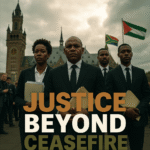

South Africa ICJ Genocide Case Will Continue Despite Gaza Ceasefire
The History Behind The Headlines
By Darius Spearman (africanelements)
Support African Elements at patreon.com/africanelements and hear recent news in a single playlist. Additionally, you can gain early access to ad-free video content.
Introduction: South African Legal Action and the Gaza Ceasefire
Recently, President Cyril Ramaphosa confirmed that South Africa’s genocide case against Israel at the International Court of Justice will proceed even though a new ceasefire has been announced in Gaza. Consequently, this decision places legal accountability at the center of a ceasefire debate, as well as the broader struggle for humanitarian protections and racial justice. Furthermore, South Africa’s action draws on a long history of the country using international law to address mass injustice, particularly as a former liberation movement turned democracy seeking moral leadership on the world stage. (This article tracks the current legal posture, historical roots, and why it matters to Black and diaspora communities.)
Detailed Analysis of the Current News Story: ICJ Case Timeline and Political Stakes
South Africa filed its case at the International Court of Justice in December 2023, alleging that Israeli conduct in Gaza amounts to genocide. Recently, Ramaphosa told Parliament that the ceasefire will not affect the case and that Israel is expected to submit its response by mid-January 2026. Consequently, the legal calendar remains intact: written pleadings continue and oral hearings are scheduled for subsequent years. (President Ramaphosa’s comments were reported directly following the ceasefire announcement.) (Al Jazeera).
In addition, the ICJ previously issued provisional measures related to Gaza, requiring Israel to take steps to prevent genocidal acts and to ensure humanitarian relief. These provisional orders remain part of the legal landscape, and South Africa’s memorial—substantial in length—frames the merits argument that the court must adjudicate even if hostilities pause. In short, the state seeks a formal legal determination, remedies, and a record that can inform accountability mechanisms. (Times of Israel).
Moreover, multiple states and human-rights groups have engaged politically and legally, offering support or amicus briefs. Spain, Ireland, Türkiye, and Colombia are among states cited as aligned with South Africa on aspects of the case, and global rights organizations have underlined the importance of an independent legal finding. As a result, the case has become a focal point for international debate about what legal accountability means during wartime. (Al Jazeera).
Historical Context: South Africa’s Legal Memory and Transnational Solidarity
South Africa’s decision to bring a genocide case is steeped in its own anti-apartheid past and the legal architecture that followed. As a country shaped by international solidarity and human-rights law, South Africa has previously invoked global legal institutions to challenge injustice. Therefore, the state frames its ICJ action as consistent with a history of using courts to name and pursue accountability for massive crimes. (Al Jazeera).
From a diaspora perspective, this move also resonates with longer traditions of Black internationalism. Historically, Black activists and anti-colonial movements have sought legal and moral recognition at international fora. Consequently, South Africa’s litigation is interpreted across African and diaspora communities as an assertion that international law can be pressed to protect marginalized populations and to challenge the structural power that obstructs accountability. The legal move thus acts as an extension of solidarity beyond borders. (Africanews).
Genocide
Legal definition under the Genocide Convention: intent to destroy, in whole or in part, a national, ethnical, racial or religious group.
Provisional Measures
ICJ emergency orders to prevent irreparable harm while the case proceeds on the merits.
Memorial / Counter-Memorial
Written submissions where states present factual and legal arguments to the ICJ.
Furthermore, this case intersects with the history of racialized humanitarianism and unequal systems of protection. Therefore, communities across the African diaspora often view legal accountability as necessary to recalibrate international norms that have historically favored powerful states. The litigation is thus both legal and symbolic, aimed at altering the discursive terrain of what counts as an international outrage requiring redress. (Middle East Monitor).
Proportional Humanitarian Impact
Source: Palestinian Health Authority & ICJ Reporting — via Al Jazeera
Why the ICJ Case and Ceasefire Matter to the African Diaspora and Global Racial Justice
From an African Diaspora perspective, the case carries moral weight. In addition to immediate humanitarian concerns, diasporic communities tend to read the litigation as a test of whether international law can protect historically marginalized groups. Consequently, a court ruling that recognizes serious breaches and obliges remedial steps would be seen as progress toward equal protection under international norms. (Africanews).
In addition, the case affects transnational solidarity networks: legal records, memorials, and rulings provide material for activism, reparative claims, and future policy. Therefore, even a pause in fighting that lacks an accountability trajectory risks perpetuating cycles of harm. This is why South Africa and its supporters argue that legal processes must proceed regardless of temporary political arrangements. (Al Jazeera).
Conclusion: Legal Process, Memory, and Future Accountability
In closing, South Africa’s decision to proceed at the ICJ while a ceasefire is in place is deliberate. The state seeks a binding legal determination and a record that could inform reparations, sanctions, or further litigation. From a diasporic and Black internationalist lens, the case embodies a demand that international law serve as a remedy against systemic violence. Thus, this legal process matters not only for Gaza and Israel, but for how global institutions will respond to grave harm in the future. (Al Jazeera).
ABOUT THE AUTHOR
Darius Spearman has been a professor of Black Studies at San Diego City College since 2007. He is the author of several books, including Between The Color Lines: A History of African Americans on the California Frontier Through 1890. You can visit Darius online at africanelements.org.
